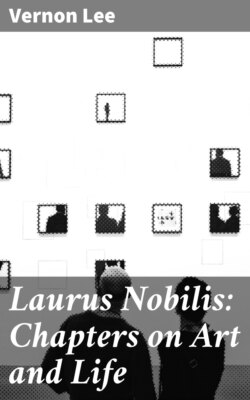Читать книгу Laurus Nobilis: Chapters on Art and Life - Vernon Lee - Страница 26
На сайте Литреса книга снята с продажи.
III.
Оглавление'Tis no excessive puritanism to say that while pleasure, in the abstract, is a great, perhaps the greatest, good; pleasures, our actual pleasures in the concrete, are very often evil.
Many of the pleasures which we allow ourselves, and which all the world admits our right to, happen to be such as waste wealth and time, make light of the advantage of others, and of the good of our own souls. This fact does not imply either original sinfulness or degeneracy—religious and scientific terms for the same thing—in poor mankind. It means merely that we are all of us as yet very undeveloped creatures; the majority, moreover, less developed than the minority, and the bulk of each individual's nature very much in the rear of his own aspirations and definitions. Mankind, in the process of adapting itself to external circumstances, has perforce evolved a certain amount of intellectual and moral quality; but that intellectual and moral quality is, so far, merely a means for rendering material existence endurable; it will have to become itself the origin and aim of what we must call a spiritual side of life. In the meanwhile, human beings do not get any large proportion of their enjoyment from what they admit to be their nobler side.
Hence it is that even when you have got rid of the mere struggle for existence—fed, clothed, and housed your civilised savage, and secured food, clothes, and shelter for his brood—you have by no means provided against his destructive, pain-giving activities. He has spare time and energy; and these he will devote, ten to one, to recreations involving, at the best, the slaughter of harmless creatures; at the worst, to the wasting of valuable substance, of what might be other people's food; or else to the hurting of other people's feelings in various games of chance or skill, particularly in the great skilled game of brag called "Society."
Our gentlemanly ancestors, indeed, could not amuse themselves without emptying a certain number of bottles and passing some hours under the table; while our nimble-witted French neighbours, we are told, included in their expenditure on convivial amusements a curious item called la casse, to wit, the smashing of plates and glasses. The Spaniards, on the other hand, have bull-fights, most shocking spectacles, as we know, for we make it a point to witness them when we are over there. Undoubtedly we have immensely improved in such matters, but we need a great deal of further improvement. Most people are safe only when at work, and become mischievous when they begin to play. They do not know how to kill time (for that is the way in which we poor mortals regard life) without incidentally killing something else: proximately birds and beasts, and their neighbours' good fame; more remotely, but as surely, the constitution of their descendants, and the possible wages of the working classes.
It is quite marvellous how little aptness there is in the existing human being for taking pleasure either in what already exists ready to hand, or in the making of something which had better be there; in what can be enjoyed without diminishing the enjoyment of others, as nature, books, art, thought, and the better qualities of one's neighbours. In fact, one reason why there is something so morally pleasant in cricket and football and rowing and riding and dancing, is surely that they furnish on the physical plane the counterpart of what is so sadly lacking on the spiritual: amusements which do good to the individual and no harm to his fellows.
Of course, in our state neither of original sinfulness nor of degeneracy, but of very imperfect development, it is still useless and absurd to tell people to make use of intellectual and moral resources which they have not yet got. It is as vain to preach to the majority of the well-to-do the duty of abstinence from wastefulness, rivalry, and ostentation as it is vain to preach to the majority of the badly-off abstinence from alcohol; without such pleasures their life would be unendurably insipid.
But inevitable as is such evil in the present, it inevitably brings its contingent of wretchedness; and it is therefore the business of all such as could become the forerunners of a better state of things to refuse to follow the lead of their inferiors. Exactly because the majority is still so hopelessly wasteful and mischievous, does it behove the minority not merely to work to some profit, but to play without damage. To do this should become the mark of Nature's aristocracy, a sign of liberality of spiritual birth and breeding, a question of noblesse oblige.
